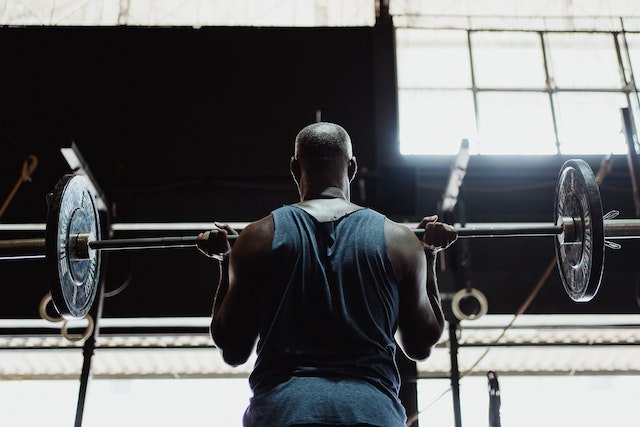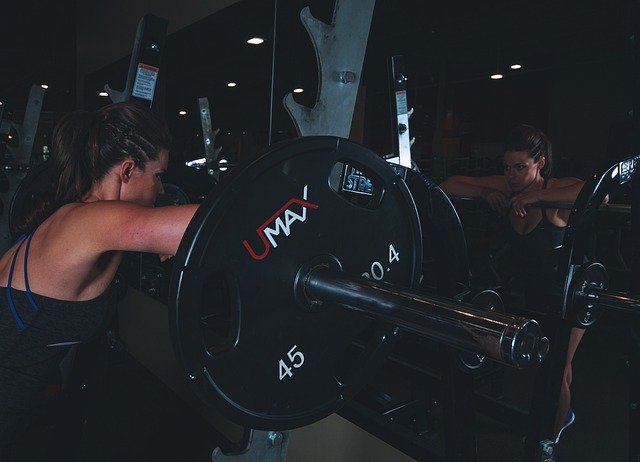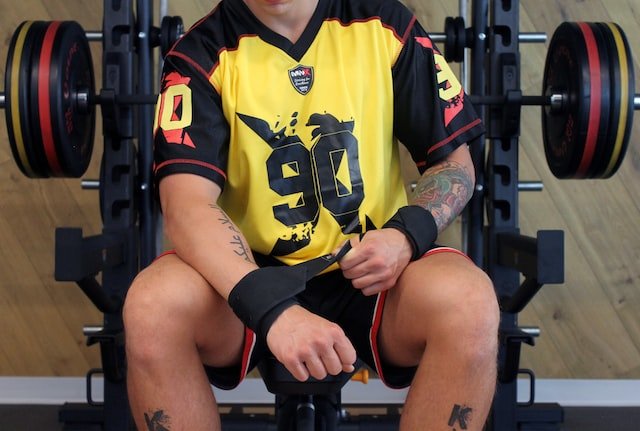
Does My Bench Press Affect My Overhead Press? 10 Important Factors To Consider
Do you ever wonder how the exercises you do in the gym impact your performance in other exercises? You may have heard that your bench press can affect your overhead press, but is that really true?
These two exercises are among the most popular in the gym, so it’s no surprise that people are interested in the relationship between them.
In this blog post, we’ll take a closer look at how the two exercises interact and explain why your bench press might be affecting your overhead press. Let’s go…
Does my bench press affect my overhead press?
The bench press mainly works your pecs, front delts, and triceps, while your overhead press works your traps, delts, and triceps. Both exercises are important for building strength and size in the upper body. Which way the bench press will affect your overhead press depends on how you are training and your goals. Personally, I wouldn’t work these muscle groups on the same day because they are both pretty taxing. If you are doing the bench press as part of a strength-training program, then it will likely have a positive impact on your overhead press. This is because the bench press will help you build strength in the muscles used in the overhead press. If you are trying to build muscle size, then the bench press may have a negative impact on your overhead press. This is because the bench press will cause your muscles to fatigue more quickly, which can lead to reduced performance in the overhead press if the exercises are done too close together. So make sure you allow enough recovery in between exercises. If you are trying to improve your overhead press, then you may want to consider changing the order of your exercises. For example, you could do the overhead press first and then the bench press later in the week. If you are trying to build strength, then the bench press will likely have a positive impact on your overhead press.
Both exercises utilise front delts
Both bench press and overhead press utilise the front delts, which are the muscles in the front of your shoulders.
The bench press is a compound exercise that also works the chest and triceps, while the overhead press works the shoulders and triceps.
The bench press can help you build strength in the muscles used in the overhead press. As the front delts are responsible for bringing the weight forward and up in both exercises, so they are essential for both movements.
This is why the bench press may have a positive impact on your overhead press. The chest and triceps help to take some of the load off the front delts, which means that the front delts can recover more quickly.
They complement each other
The bench press and overhead press are two very different exercises.
The bench press is a pressing movement that involves moving the weight away from your body, while the overhead press is a pushing movement that involves moving the weight overhead.
The different motions work different muscle groups and can help to improve your strength and size in different ways.
The bench press is a great exercise for building strength and size in the chest, shoulders, and triceps. The overhead press is a great exercise for building strength and size in the shoulders and triceps.
Both exercises are important for building strength and size in the upper body. The bench press will help you build strength in the muscles used in the overhead press. The overhead press will help you build strength in the muscles used in the bench press.
The two exercises complement each other and can help you to build a strong and muscular upper body.

Recovery between sessions is key
If you are doing the bench press one day and the overhead press the next, then you need to make sure you are allowing enough recovery time between sessions.
This is because the front deltoid muscles will be fatigued from the bench press and will not be able to recover fully before the overhead press.
You should allow at least 48 hours of recovery between sessions.
However, if for any reason you are doing the bench press and overhead press on the same day, then you need to make sure you are allowing enough recovery time between sets.
This is because the front deltoid muscles will be fatigued from the bench press and will not be able to recover fully before the next set of overhead press.
You should allow at least 3 minutes of recovery between sets. This also applies if you decide to do your overhead press first, as the front deltoid muscles will be fatigued for the bench press.
Related: Why Is Shoulder Press So Hard? All The Answers For Rapid Progress
Your goals will dictate how you train
How the bench press affects your overhead press will depend on how you are training and your goals.
If you are aimlessly going through the motions, then the bench press is not going to have a positive impact on your overhead press.
However, if you are using a bench press program that is designed to improve your overhead press, then the bench press will have a positive impact on your overhead press.
You need to think about what you want and the reasons why you want it.
Your traps, rear delts, and triceps all assist in the bench press. So, if these muscles are weak, it will negatively affect your bench press.
Also, by increasing your bench press, you’ll be able to better activate your traps and rear delts when you do overhead presses. This will help you to increase your overhead pressing strength.
By increasing your overhead pressing strength, you’ll be better able to stabilize the weight on your chest when you bench press. This will help you to increase your bench pressing strength.
While the two exercises don’t have a lot of overlap in terms of which muscle groups they work, they do complement each other.
By increasing your strength in both exercises, you’ll be better able to build overall upper body strength.
Don’t burnout
You need to be careful not to overtrain the muscles used in the bench press and overhead press. Overtraining these muscle groups can lead to injury and burnout.
As mentioned previously, the front deltoids are used in both the bench press and overhead press.
If you overtrain these muscles, you could end up with an overuse injury. It’s important to listen to your body and take breaks when you need them.
If you find that your bench press is affecting your overhead press or vice versa, then take a few days off from training.
If you are overtraining, you might not get injured as such, but you won’t be able to get the most out of either exercise due to fatigue.
It’s important to find a balance between pushing yourself and taking care of your body.
Related: How Much Of Your Body Weight Should You Be Able To Overhead Press? 8 Crucial Factors To Consider
Have you considered a de-load phase?
A de-load phase is a period of time where you reduce the volume and intensity of your training.
This can be a good time to focus on your form and technique. It can also be a good time to focus on other aspects of your training, such as your diet and recovery.
A de-load phase can last anywhere from a few days to a couple of weeks.
If you find that your bench press is affecting your overhead press, then a de-load phase might be a good idea.
By taking a break, you give your body time to heal so that you can focus on improving your form and technique. It’s important to listen to your body and not push yourself too hard.
If you find that you are struggling to complete your sets or that your form is starting to suffer, then it’s time to take a break.
Have you plateaued?
If you find that you’re no longer making progress with your bench press or overhead press, then you might have reached a plateau.
There are a number of ways to overcome a plateau.
You can try changing your routine, such as the exercises you are doing, the order of your exercises, the number of sets and reps you are doing, or the amount of weight you are lifting.
You can also try focusing on a different muscle group for a couple of weeks.
This will give your body a chance to recover from the demands of your current routine.
Remember that you need to keep your body guessing when it comes to exercise.
If you find that you’re not making progress, then try something new. If you’re feeling stuck, it might be time to ask for help from a professional.
A professional can help you to identify any underlying issues that might be affecting your progress.
They can also help you to create a customized plan that will help you to reach your goals.

Is your form to blame?
If you find that your bench press is affecting your overhead press, then it might be due to your form.
It’s important to focus on your form when you are doing any exercise. If your form is poor, then you won’t be able to activate the right muscle groups.
This can lead to injuries and a decrease in your performance.
If you find that your form is negatively impacting exercises such as the bench press or overhead press, then focus on improving your technique.
Reduce the weight you are lifting and focus on using perfect form, sometimes you have to go backwards in order to move forwards.
A professional can help you to identify any issues with your form and correct them.
Improving your form will take time and patience, but it’s worth it if it means you can avoid injuries and get the most out of any exercise long-term.
Related: Why Are My Shoulders Never Sore? 16 Crucial Factors To Consider
Are you using the right weight?
If you find that your bench press is affecting your overhead press, then it might be due to the weight you are using.
If you are using too much weight, then you won’t be able to maintain good form. This can lead to injuries and a decrease in your performance.
It’s important to find the right balance between using too much and too little weight.
If you are using too little weight, then you won’t be challenging your muscles enough. This can lead to stagnation in your progress.
The best way to find the right weight is to experiment until you find a weight that you can lift with good form for the desired number of reps.
Final thoughts…
Your bench press can affect your overhead press, but it’s important to remember that these are two separate exercises.
If you find that your bench press is impacting your overhead press, then focus on improving your form, using the right weight, and giving your body time to recover.
If you’re still not happy, then it might be time to ask for help from a professional.
Remember that consistency is key when it comes to exercise.
If you find that you’re not making progress, then don’t be afraid to try something new.
The most important thing is that you enjoy the process and stick with it long-term.
Has your bench press affect your overhead press? Let me know in the comments section below.


